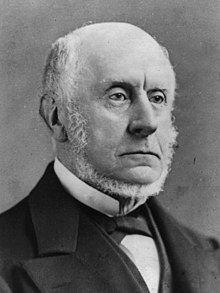
Back تشارلز فرانسيس آدمز (الأب) Arabic تشارلز فرانسيس آدمز ARZ چارلز فرانسیس آدامز سر. AZB Charles Francis Adams Czech Charles Francis Adams, Sr. German Τσαρλς Φράνσις Άνταμς Greek Charles Francis Adams Spanish چارلز فرنسیس آدامز سنیور Persian Charles Francis Adams, Sr. French Charles Francis Adams, Sr. Hungarian
Charles Francis Adams Sr. | |
|---|---|
 Adams in 1861 | |
| United States Envoy to the United Kingdom | |
| In office May 16, 1861 – May 13, 1868 | |
| President | Abraham Lincoln Andrew Johnson |
| Preceded by | George M. Dallas |
| Succeeded by | Reverdy Johnson |
| Member of the U.S. House of Representatives from Massachusetts's 3rd district | |
| In office March 4, 1859 – May 1, 1861 | |
| Preceded by | William S. Damrell |
| Succeeded by | Benjamin Thomas |
| Member of the Massachusetts Senate | |
| In office 1843–1845 | |
| Member of the Massachusetts House of Representatives | |
| In office 1840–1843 | |
| Personal details | |
| Born | Charles Francis Adams August 18, 1807 Boston, Massachusetts, U.S. |
| Died | November 21, 1886 (aged 79) Boston, Massachusetts, U.S. |
| Political party | Whig (Before 1848) Free Soil (1848–1854) Republican (1854–1870) Liberal Republican (1870–1872) Anti-Masonic (1872–1876) Democratic (1876–1886) |
| Spouse |
Abigail Brown Brooks
(m. 1829) |
| Children | 7, including John, Charles Jr., Henry, and Brooks |
| Parents | |
| Relatives | Adams political family |
| Education | Harvard University (BA) |
Charles Francis Adams Sr. (August 18, 1807 – November 21, 1886) was an American historical editor, writer, politician, and diplomat.[1] As United States Minister to the United Kingdom during the American Civil War, Adams was crucial to Union efforts to prevent British recognition of the Confederate States of America and maintain European neutrality to the utmost extent. Adams also featured in national and state politics before and after the Civil War.
Adams was the patriarch of one of the United States's most prominent political families: his father and grandfather were Presidents John Quincy Adams and John Adams respectively, about whom he wrote a major biography. He had seven children, including John Quincy II, Charles Jr., Henry, and Brooks.
Adams served two terms in the Massachusetts State Senate before helping to found the abolitionist Free Soil Party in 1848; he was the party's vice-presidential candidate in the election of 1848 on a ticket with former president Martin Van Buren. He was elected to the United States House of Representatives in 1858 and re-elected in 1860.
During the Civil War, Adams served as the United States Minister to the United Kingdom under Abraham Lincoln, where he played a key role in keeping the British government neutral and not diplomatically recognizing the Confederacy. After the War, he became alienated from the Republican Party and was successively a Liberal Republican, Anti-Mason, and Democrat. In 1876, he was the unsuccessful Democratic nominee for Governor of Massachusetts.
Adams became an overseer of Harvard University and built the Stone Library at Peacefield, the Adams's family home which is now part of the Adams National Historical Park in Quincy, Massachusetts, to honor his father.